- Region
- Águilas
- Alhama de Murcia
- Jumilla
- Lorca
- Los Alcázares
- Mazarrón
- San Javier
-
ALL AREAS & TOWNS
- AREAS
- SOUTH WEST
- MAR MENOR
- MURCIA CITY & CENTRAL
- NORTH & NORTH WEST
- TOWNS
- Abanilla
- Abarán
- Aguilas
- Alamillo
- Alcantarilla
- Aledo
- Alhama de Murcia
- Archena
- Balsicas
- Blanca
- Bolnuevo
- Bullas
- Cañadas del Romero
- Cabo de Palos
- Calasparra
- Camping Bolnuevo
- Campo De Ricote
- Camposol
- Canada De La Lena
- Caravaca de la Cruz
- Cartagena
- Cehegin
- Ceuti
- Cieza
- Condado de Alhama
- Corvera
- Costa Cálida
- Cuevas De Almanzora
- Cuevas de Reyllo
- El Carmoli
- El Mojon
- El Molino (Puerto Lumbreras)
- El Pareton / Cantareros
- El Raso
- El Valle Golf Resort
- Fortuna
- Fuente Alamo
- Hacienda del Alamo Golf Resort
- Hacienda Riquelme Golf Resort
- Isla Plana
- Islas Menores & Mar de Cristal
- Jumilla
- La Azohia
- La Charca
- La Manga Club
- La Manga del Mar Menor
- La Pinilla
- La Puebla
- La Torre
- La Torre Golf Resort
- La Unión
- Las Palas
- Las Ramblas
- Las Ramblas Golf
- Las Torres de Cotillas
- Leiva
- Librilla
- Lo Pagan
- Lo Santiago
- Lorca
- Lorquí
- Los Alcázares
- Los Balcones
- Los Belones
- Los Canovas
- Los Nietos
- Los Perez (Tallante)
- Los Urrutias
- Los Ventorrillos
- Mar De Cristal
- Mar Menor
- Mar Menor Golf Resort
- Mazarrón
- Mazarrón Country Club
- Molina de Segura
- Moratalla
- Mula
- Murcia City
- Murcia Property
- Pareton
- Peraleja Golf Resort
- Perin
- Pilar de la Horadada
- Pinar de Campoverde
- Pinoso
- Playa Honda
- Playa Honda / Playa Paraíso
- Pliego
- Portmán
- Pozo Estrecho
- Puerto de Mazarrón
- Puerto Lumbreras
- Puntas De Calnegre
- Region of Murcia
- Ricote
- Roda Golf Resort
- Roldan
- Roldan and Lo Ferro
- San Javier
- San Pedro del Pinatar
- Santiago de la Ribera
- Sierra Espuña
- Sucina
- Tallante
- Terrazas de la Torre Golf Resort
- Torre Pacheco
- Totana
- What's On Weekly Bulletin
- Yecla


- EDITIONS:
 Spanish News Today
Spanish News Today
 Alicante Today
Alicante Today
 Andalucia Today
Andalucia Today
Free guided tours in the city of Cartagena 2024!
Contact your guide and arrange a visit to Cartagena whenever you like!
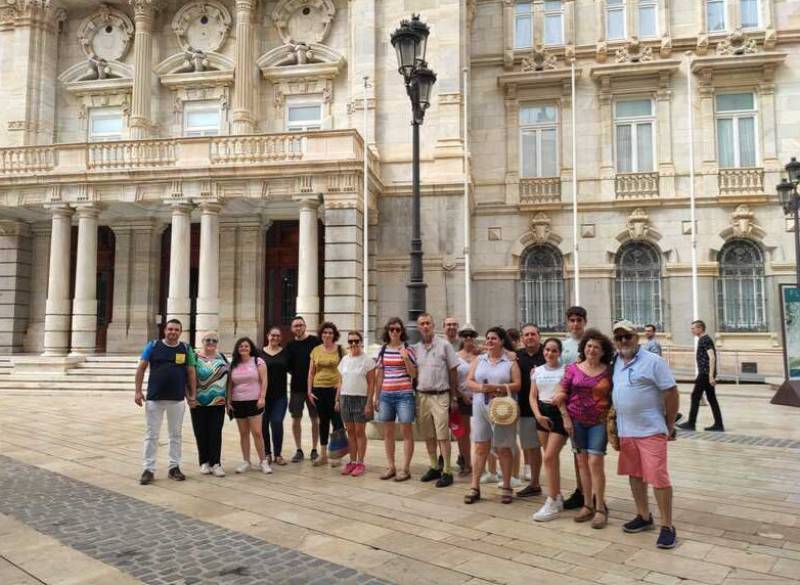 During the remainder of 2024 the tourist board of the Region of Murcia has organized a series of guided tours which can be contracted on any date and at any time by groups of between 2 and 29 people.
During the remainder of 2024 the tourist board of the Region of Murcia has organized a series of guided tours which can be contracted on any date and at any time by groups of between 2 and 29 people.
These tours are all free of charge except where admission fees to museums and other establishments are payable, and most of them can be held in English: see below for the list of registered guides and the languages they offer.
The locations are in many different towns and cities of the Region, and while it is to be expected that Murcia and Cartagena feature prominently there are also other fascinating visits in Lorca, Cieza, Caravaca and more.
The tours listed in Cartagena are the following:
- The Mediterranean port of Cartagena (“Cartagena, puerto del Mediterráneo”)
 A 2-hour tour which includes the Plaza del Ayuntamiento, Plaza Héroes de Cavite, the seafront Paseo Alfonso XII, the Museo Naval and the ARQUA national underwater archaeological museum.
A 2-hour tour which includes the Plaza del Ayuntamiento, Plaza Héroes de Cavite, the seafront Paseo Alfonso XII, the Museo Naval and the ARQUA national underwater archaeological museum.
In the 16th century Cartagena was named the home of the Royal Galleys of Spain, and two hundred years later towards the end of the 18th century it became the navy’s Maritime Capital of the Mediterranean. These two honours led to the city being endowed with a fantastic range of castles, fortresses, an arsenal and even defensive walls to protect the most important military port of the Spanish Mediterranean.
In the decades that followed, the industrialized mining boom brought economic prosperity to go along with the military prestige, and this opulent status is reflected in the palatial residences which still line the streets of the Calle Mayor and others in the old centre.
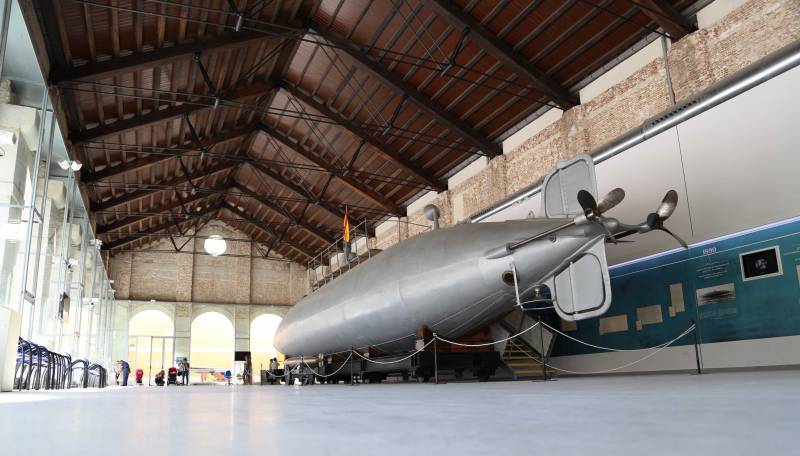 This guided visit includes a stop in the Naval Museum, where the first electrically powered submarine (designed in Cartagena by Isaac Peral) is housed, and the Museo Nacional de Arqueología Subacuática (ARQUA), where among the exhibits is the treasure found with the wreck of the galleon Nuestra Señora de las Mercedes. Along the way your guide will also be pointing out and explaining some of the military and Modernist architecture which adorn the streets, all of it made possible by the development of Cartagena as a port city with the rich heritage of the many different cultures which have settled and governed here over the last 3,000 years.
This guided visit includes a stop in the Naval Museum, where the first electrically powered submarine (designed in Cartagena by Isaac Peral) is housed, and the Museo Nacional de Arqueología Subacuática (ARQUA), where among the exhibits is the treasure found with the wreck of the galleon Nuestra Señora de las Mercedes. Along the way your guide will also be pointing out and explaining some of the military and Modernist architecture which adorn the streets, all of it made possible by the development of Cartagena as a port city with the rich heritage of the many different cultures which have settled and governed here over the last 3,000 years.
Admission to the Museo Naval but for the ARQUA museum it is necessary to pay 3 euros per head on working weekdays (free of charge on Saturdays from 14.00 to 20.00 and on Sundays from 10.00 to 15.00).
2. Roman Cartagena (“Uno de Romanos”)
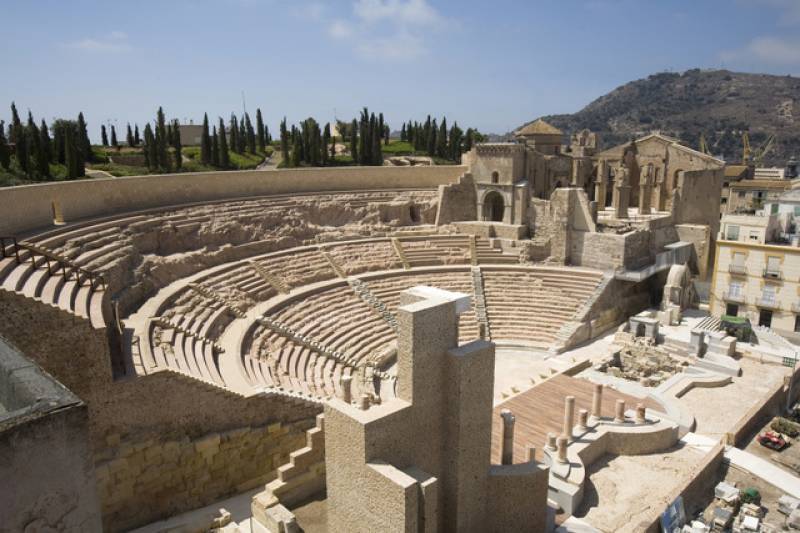 After a brief period of Carthaginian rule in the 3rd century BC it was the Romans who consolidated “Carthago Nova” as an important trading and military port, and this tour takes visitors to some of the many vestiges of the centuries of Roman rule over the following centuries.
After a brief period of Carthaginian rule in the 3rd century BC it was the Romans who consolidated “Carthago Nova” as an important trading and military port, and this tour takes visitors to some of the many vestiges of the centuries of Roman rule over the following centuries.
The Romans captured the city during the Second Punic War, when the Carthaginian Hannibal, son of Hasdrubal, set off from Cartagena on his famed journey with the intention of overthrowing the authorities in Rome itself.
This great power struggle is a part of Cartagena’s history of which the modern-day population are proud, and the annual “Cartagineses y Romanos” fiestas are now among the most important dates in the calendar. The route of the “Uno de Romanos” tour takes in many of the Roman remains which have been unearthed – and are still being unearthed – in recent decades, such as the Punic Wall, the remains in Calle San Diego, the Casa de la Fortuna, Plaza San Francisco, the area around the forum district on the Molinete hill, the “Decumano Máximo” street, Plaza San Sebastián, Calle Mayor, the Plaza del Ayuntamiento and of course the Roman Theatre Museum.
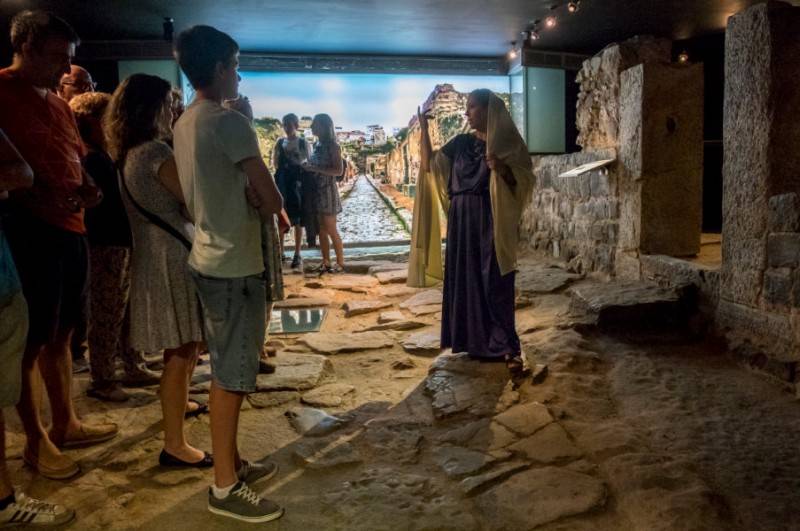 The quantity and quality of these remains has led to Cartagena becoming one of the most important cities in Europe for archaeologists, and this is your chance to see why!
The quantity and quality of these remains has led to Cartagena becoming one of the most important cities in Europe for archaeologists, and this is your chance to see why!
Although the services of the tour are free of charge, the combined admission fees to the Casa de la Fortuna, the Punic Wall centre and the Roman Theatre cost 13 euros per person (10 euros for large groups, the unemployed, OAPs, students and large families).
3. Modernist Cartagena
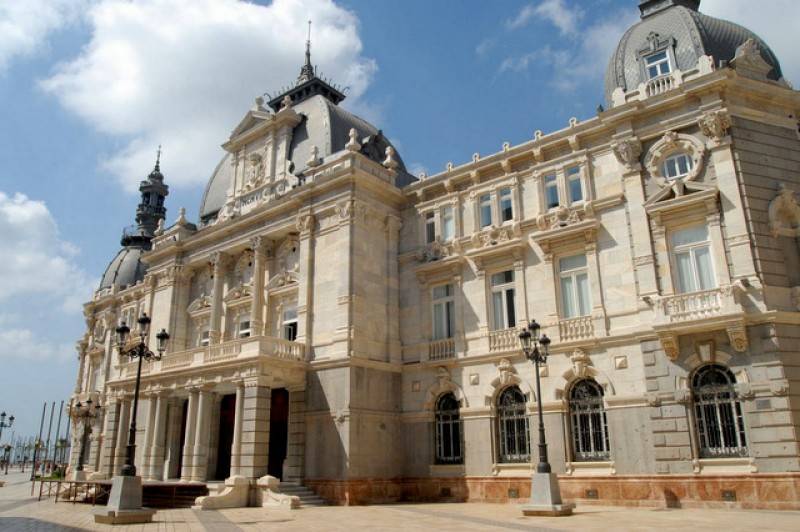 Another 2-hour route which takes visitors to many of the splendid buildings which appeared in Cartagena in the late 19th century, when the city at last returned to being a wealthy and important port after decades, even centuries, of relative obscurity. This was due in part to Cartagena being chosen as the main Spanish navy base in the Mediterranean – the Navy’s “Mediterranean capital” – and in part to the resurgence of mining brought about by the Industrial Revolution, which made it possible to extract minerals which had previously lain untouched.
Another 2-hour route which takes visitors to many of the splendid buildings which appeared in Cartagena in the late 19th century, when the city at last returned to being a wealthy and important port after decades, even centuries, of relative obscurity. This was due in part to Cartagena being chosen as the main Spanish navy base in the Mediterranean – the Navy’s “Mediterranean capital” – and in part to the resurgence of mining brought about by the Industrial Revolution, which made it possible to extract minerals which had previously lain untouched.
High-ranking navy officers and those who profited from the mines built a series of palatial Modernist residences in the city, and this tour in the old centre includes the room in which Isaac Peral’s pioneering submarine is displayed, the Palacio Consistorial in the Plaza del Ayuntamiento, the Calle Mayor, the Plaza del Rey, Plaza San Sebastián, Plaza San Francisco and the Palacio Aguirre in Plaza de la Merced.
The route begins at the tourist office in the Plaza del Ayuntamiento before heading to the seafront to visit the Peral Submarine. Returning to the Plaza del Ayuntamiento, there is a stop in the grand entry hall of the Palacio Consistorial and then in the Calle Mayor, still a pedestrian street, the sights include the magnificent façades of the Casa Cervantes and the Casino.
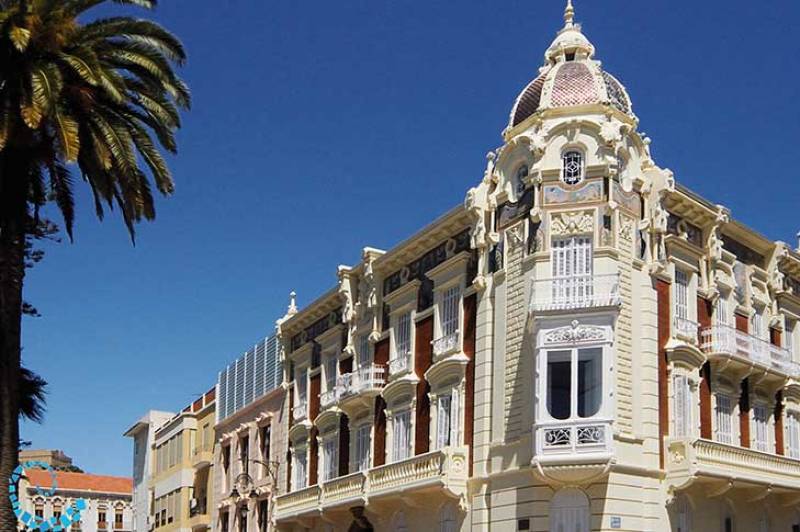 From here it’s a short walk to the Plaza del Rey, which plays a central role in the city’s renowned Semana Santa processions, and next on the itinerary are the emblematic Gran Hotel and the Casa Maestre. Finally, it’s on to the Palacio de Don Camilo Aguirre, a luxurious mansion which gives us an insight into the well-heeled lifestyle of the bourgeois of Cartagena well over a century ago (it is now home to the regional museum of modern art).
From here it’s a short walk to the Plaza del Rey, which plays a central role in the city’s renowned Semana Santa processions, and next on the itinerary are the emblematic Gran Hotel and the Casa Maestre. Finally, it’s on to the Palacio de Don Camilo Aguirre, a luxurious mansion which gives us an insight into the well-heeled lifestyle of the bourgeois of Cartagena well over a century ago (it is now home to the regional museum of modern art).
CONTACT YOUR TOUR GUIDE
The guides listed by the ITREM tourist board are the following:
NATALIA BUSTAMANTE - nabuste@hotmail.com, telephone 679 630549
Languages: Spanish / French / English
MARÍA INMACULADA ARRES SERRANO - mariainmaculada.arres@gmail.com, telephone 628 438273
Languages: English / Italian
TUDMIR SERVICIOS TURÍSTICOS - info@tudmirst.com, telephone 691 022019
Languages: English
MARIÁN HERRERO MARTÍNEZ - marianherrero@gmail.com, telephone 661 471640
Languages: English
MAYCA DENGRA ROMERO - info@visitasguiadasmurcia.com, telephone 610 689900 / 968 219099
MIGUEL ÁNGEL POMARES AROCA - info@guiasmur.com, telephone 616 717888
Languages: Spanish
CAROLINA GUTIÉRREZ MARTÍNEZ - caro.gutierrez.martinez@gmail.com, 620 442311
Languages: Spanish
JOSÉ ANTONIO GÁZQUEZ MILANÉS - info@stipaturismo.com, telephone 658 641101
YOLANDA RIQUELME MARCOS - yorimarcos@hotmail.com, telephone 686 199961
Source: ITREM





